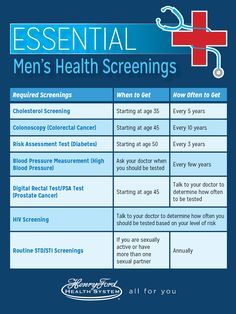
In today’s fast-paced world, men often overlook the importance of prioritizing their health. While busy with work, family, and personal commitments, men tend to neglect routine check-ups and preventive measures. However, by taking proactive steps to maintain their well-being, men can reduce their risk of developing serious health issues. In this article, we will discuss the key screenings and preventive measures that men should prioritize to ensure a long and healthy life.
The Importance of Regular Check-ups
Regular check-ups with healthcare professionals play a vital role in preventing and detecting potential health problems. Men should aim to visit their primary care physician at least once a year for a comprehensive check-up. During these visits, doctors can evaluate overall health, assess risk factors, and recommend appropriate screenings based on individual health history.
Screenings for Cardiovascular Health
Heart disease is one of the leading causes of death among men. To prevent and diagnose cardiovascular issues, certain screenings are essential:
Blood Pressure Measurement:
High blood pressure is a significant risk factor for heart disease. Regular blood pressure checks are vital for early detection and management.
Cholesterol Level Testing:
Elevated cholesterol levels can lead to heart problems. Regular lipid profile testing helps determine cholesterol levels and the need for dietary modifications or medication.
Diabetes Screening:
Men with diabetes are at higher risk of developing heart disease. Regular blood sugar testing can help manage glucose levels and prevent potential complications.
Prostate Health and Cancer Screening
Prostate cancer is the second most common cancer among men. Early detection is crucial for successful treatment. The following screenings aid in identifying potential prostate issues:
Prostate-Specific Antigen (PSA) Test:
The PSA test measures prostate-specific antigen levels in the blood, helping identify potential prostate problems. It is recommended for men over the age of 50, or earlier for those at higher risk.
Digital Rectal Exam (DRE):
A DRE allows a doctor to physically examine the prostate for abnormalities. It is often performed in conjunction with the PSA test to increase detection accuracy.
Testicular Cancer Self-Examination
Although not a standard medical screening, regular self-examinations can aid in early detection of testicular cancer. Men should be familiar with the texture and size of their testicles and report any unusual changes promptly to a healthcare provider.
Preventive Measures for Optimal Health
Aside from routine screenings, there are several preventive measures men can take to maintain optimal health:
Regular Exercise:
Staying physically active reduces the risk of numerous health conditions, including heart disease, obesity, and diabetes. Aim for at least 150 minutes of moderate-intensity aerobic exercise per week, or 75 minutes of vigorous activity.
Healthy Diet:
Consuming a balanced diet plays a pivotal role in maintaining overall health. Emphasize fruits, vegetables, whole grains, lean proteins, and limit processed foods, saturated fats, and added sugars.
Smoking Cessation:
Smoking is a leading cause of preventable diseases such as lung cancer, heart disease, and stroke. Seek support and resources to quit smoking for good.
Mental Health Care:
Mental health is just as important as physical well-being. Address stress, anxiety, and depression by seeking appropriate support, practicing relaxation techniques, and maintaining a healthy work-life balance.
Safe Sex Practices:
Practicing safe sex helps prevent sexually transmitted infections. Use barrier methods like condoms and get regularly tested if sexually active.
Conclusion
As men navigate their busy lives, prioritizing their health shouldn’t be neglected. Regular check-ups, screenings, and adopting preventive measures are crucial steps towards a healthier future. By proactively managing their well-being, men can reduce the risks associated with various health concerns and enjoy a long and fulfilling life.

